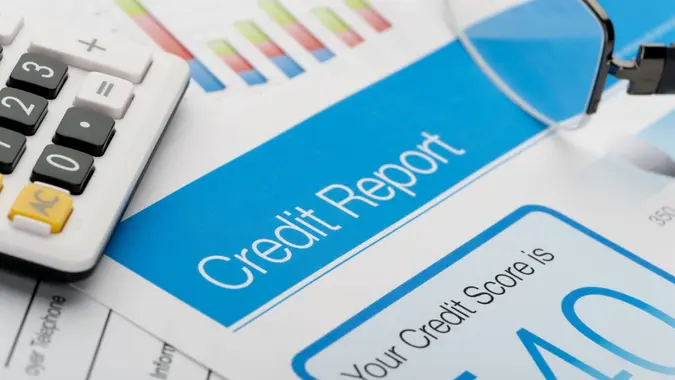I’m a Financial Expert: Here’s the Minimum Credit Score You Need To Have in Your Life

Commitment to Our Readers
GOBankingRates' editorial team is committed to bringing you unbiased reviews and information. We use data-driven methodologies to evaluate financial products and services - our reviews and ratings are not influenced by advertisers. You can read more about our editorial guidelines and our products and services review methodology.

20 Years
Helping You Live Richer

Reviewed
by Experts

Trusted by
Millions of Readers
When it comes to financial goals, your credit score can significantly impact how easily you’ll be able to achieve them.
“As a certified public accountant with over a decade of experience helping clients manage their finances, I can attest to the importance of maintaining a healthy credit score,” said Nischay Rawal, certified public accountant and founder of NR Tax & Consulting. “In my line of work, I’ve seen how a good credit score can open doors, while a poor one can create financial hurdles.”
Below, experts weigh in on the minimum credit score you need to have in your life.
A Higher Score Helps You Buy a Home or Secure a Loan
For most financial goals, such as buying a home or securing a loan, a credit score of at least 700 is a reasonable target, said Rawal.
“This score typically allows you to qualify for favorable interest rates and terms,” he explained. “For example, clients with scores above 700 often secure mortgages with lower interest rates, translating to significant savings over the life of the loan. On the other hand, a lower score may result in higher interest rates, increasing your overall cost.”
If you’re looking to obtain favorable interest rates on credit cards, Rawal said aiming for a score around 750 or higher is ideal. “This range usually unlocks the best credit card offers, including lower APR[s], better rewards programs and higher credit limits.”
“For instance,” he said, “one of my recent clients improved their score from 680 to 750 and subsequently qualified for a premium credit card with extensive travel rewards and no annual fee, which was previously out of reach.”
However, he added that even with scores lower than 700, there are actionable steps you can take to improve. “Regularly monitoring your credit report for errors, making timely payments and reducing outstanding debt can gradually increase your score.
“In my experience, clients who implemented these strategies saw improvements within a few months, moving from suboptimal scores to ones that provided better financial opportunities.”
A Lower Credit Score Can Result in Higher Interest Rates
“The ideal credit score range largely depends on an individual’s financial objectives,” said Abid Salahi, co-founder of FinlyWealth, a credit card recommendation platform that empowers users with personalized financial solutions. “Generally, a credit score above 700 is considered good, while a score above 800 is considered excellent.”
However, similarly to Rawal, he said a higher credit score is often required for significant financial milestones like purchasing a home or securing favorable interest rates on loans.
“For instance, most lenders typically require a credit score of at least 740 or higher to qualify for the best mortgage rates and terms,” he explained. “A lower credit score can result in higher interest rates, leading to thousands of dollars in additional costs over the life of the loan. In fact, according to a study by LendingTree, someone with a credit score between 760 and 850 could save over $40,000 on a $300,000, 30-year mortgage compared to someone with a credit score between 620 and 639.”
Moreover, he said that credit card issuers offer their best rewards and perks to individuals with credit scores above 750. “Those with lower scores may need help to qualify for premium credit cards or face higher interest rates and fees, limiting their ability to maximize rewards and benefits.”
Your Credit Score Impacts Your Financial Life
While a lower credit score may not immediately disqualify you from obtaining credit, Salahi said it can significantly impact your financial well-being in the long run. “Individuals with credit scores below 670 may face higher interest rates on loans, difficulty securing approvals for rental properties, and even potential employment challenges in certain industries.”
“To illustrate the importance of a strong credit score, consider this personal example,” he said. “A client of mine, Teddi, had a credit score of 620 when she applied for a car loan. Due to her lower score, she was offered an interest rate of 9%, resulting in an additional $3,000 in interest payments over the life of the loan compared to someone with a score above 700.
“By working diligently to improve her credit score, Teddi could refinance her loan a year later at a much lower interest rate, saving her thousands of dollars.”
While the minimum credit score requirements may vary based on individual circumstances, Salahi said that aiming for a score above 740 can unlock numerous financial opportunities and savings. “By maintaining a strong credit profile, individuals can position themselves for better interest rates, access to premium credit products and overall economic well-being.”
More From GOBankingRates
 Written by
Written by  Edited by
Edited by 
























